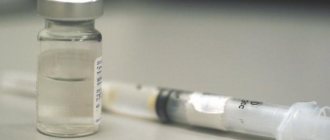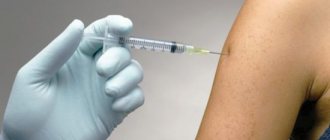Vaccination against typhoid fever is not included in the National Calendar, but is vital in certain conditions. Every year, about 21-30 million cases of typhoid fever are registered worldwide, of which 1 to 10% are fatal. In recent years, epidemics of typhoid fever have been observed in Central Asian countries. According to the World Health Organization (WHO), more than 500,000 people die from typhoid fever every year worldwide. People aged 5-19 years are most often affected, so vaccination against typhoid fever should be given to schoolchildren in endemic areas.
What is typhoid fever
Intestinal enterobacteria - Salmonella typhoid - is the causative agent of a very dangerous infectious disease, namely typhoid fever. If you don’t get preventive vaccinations on time and if you don’t take therapeutic measures if you become infected, you can bring yourself to a dying state.
Enterobacteriaceae has an important property - the ability to produce endotoxin, which is located directly inside salmonella. When it dies, this poison enters the blood, which in turn causes intoxication of the human body. Weakness appears throughout the body, the temperature rises, consciousness becomes confused and other bad things happen.
How can you get typhoid fever?
Typhoid fever can be contracted from a bacterial carrier in many ways. To prevent this disease, it is necessary to schedule preventive vaccinations. If you get vaccinated when the virus enters your body, you can also overcome typhoid fever. It is not recommended to delay vaccination.
An outbreak of the disease can occur in summer or autumn when people travel to different countries. Salmonella typhoid multiplies rapidly at high temperatures. In summer, flies can also help the bacteria spread quickly.
Contraindications
Who should refrain from getting vaccinated? First of all, this applies to those states where, due to the epidemic situation and the presence of foci of infection, immunoprophylaxis for typhoid fever is often carried out. Vaccination is not carried out for the following persons:
- If there was a reaction to a previous vaccination;
- If the child is under two years old, he or she is not given protective medications against infection;
- If a woman is expecting the birth of a baby or is already a nursing mother;
- In case of renal failure;
- In the presence of acute infections, diseases of the biliary tract or circulatory system;
- Live vaccines are not administered in the presence of HIV infections, oncology, thyroid diseases, or a weakened immune system.
Before getting vaccinated, you should read the instructions for the medications.
Where to get vaccinated
In case of planned vaccination against typhoid fever, the vaccine is given in a clinic or outpatient clinic at the place of residence. This applies more to countries where the disease is constantly recorded. There I plan immunoprophylaxis in advance.
How and where to get vaccinated if you are planning a business trip or a tourist trip to countries with an unstable epidemic situation regarding typhoid fever? Where to turn for help in such cases? The first doctor you need to visit is your local physician.
He will conduct a full examination and determine the presence of contraindications. Then, if there is an infectious disease specialist in the clinic, he will deal with vaccine prevention.
What to do if the clinic does not have a vaccine? How to vaccinate against typhoid fever for adults and children in this case? If time permits, the required drug will be ordered and delivered to the clinic. Or you can buy the vaccine yourself at a paid clinic.
Who is vaccinated against typhoid fever and is it needed at all? Vaccination is needed, but not for everyone, but only for certain categories of citizens and only during the period of infection. In our country, such immunoprophylaxis is mainly given to tourists going on vacation to exotic countries. Before vaccination, it is important not only to familiarize yourself with the contraindications - you need to consult with your doctor about all possible drugs in order to choose the most convenient and optimal one.
Typhoid fever
– an acute infectious disease that affects the intestines and its lymph nodes. The disease is accompanied by an enlarged liver and spleen, severe intoxication with high fever and clouding of consciousness.
Although the incidence of the disease has decreased over the past hundred years, the problem still remains very relevant. Every year, about 20 million people worldwide become infected with typhoid fever, and 800 thousand die from this disease. People get sick more often in developing countries, where there is not enough drinking water, poor sanitation and street food vending flourishes. Therefore, tourists who travel to Central Asia, Africa or South America should be extremely careful.
It is especially dangerous to swim in bodies of water that may be contaminated with sewage and to buy ready-made meals in markets. The highest risk is associated with dairy and meat products, in which the bacteria begins to actively multiply at a temperature of +18 C.
In Russia, thanks to sanitary control, typhoid fever was almost completely eliminated. But in recent years a new danger has arisen. Migrants who come to work and our tourists bring Salmonella typhoid from other countries. One sick person can cause infection to many people, especially if he works in the food industry.
You can become infected with typhoid fever from a sick person and from a bacteria carrier who feels completely healthy. The route of transmission is fecal-oral. This means that the bacterium is released from the intestines of a sick person and enters the mouth of a healthy person through food, drinking water, dirty hands or household items.
Large outbreaks and epidemics occur in the summer-autumn period. At high temperatures, the typhoid bacillus multiplies quickly. In addition, flies contribute to its spread.
Sensitivity to the bacterium that causes typhoid fever is high and people of any age can become infected. But according to statistics, children and young people under 30 get sick more often. This is due to the fact that they are more active: they travel more often and eat outside the home.
Indications for the vaccine against typhoid fever
It has already been discussed above what contraindications the typhoid fever vaccine has. Now let’s figure out who should get vaccinated and whether it is necessary to do it. The clinic will not give these vaccinations, but there are cases when this is urgently needed. When and who should be vaccinated against typhoid fever:
- If a person is planning to travel to those countries where outbreaks of typhoid fever prevail;
- Vaccination is carried out to laboratory workers who were directly involved in working with cell strains and in creating the vaccine itself;
- Vaccinations are given to all medical employees who go to work in regions where the disease epidemic is progressing;
- If there is no epidemic in the country, but in certain areas there have been rare cases of typhoid fever, then they can also vaccinate against the disease;
- Vaccination is carried out for employees who took part in the disinfection of infected areas; sewerage work was carried out in these areas.
Starting from the age of three, children and their parents should undergo prophylaxis to exclude the possibility of developing the disease. If an outbreak of typhoid fever occurs, the entire population is mass vaccinated.
Economic benefits of vaccination
The price is less than US dollar per vaccinated person. A sick person will take more funds from the state:
- spent on disinfection,
- places in hospitals,
- doctors time.
A hospital day costs tens of dollars. Treatment takes less than a month, excluding tests that are required 2 years after discharge.
The reduced price allows poor countries to buy drugs and vaccinate. The ways of spreading HIV have become known - doctors do not use one syringe to vaccinate several patients. Vaccination for adults is not a long-term solution. The period between injections is 2 years. The benefits of manufacturers from Switzerland and other countries, which regularly receive profits from the production of the vaccine, can be traced.
Vaccination against typhoid fever for prevention
Doctors have to combine methods when treating such a dangerous disease as typhoid fever, since one specific vaccine has not yet been created. There are two methods that completely complement each other - this is the typhoid vaccine with genetic modification ViPS and oral capsules with Tu21a.
The use of such methods is not recommended for children under two years of age, as there will be no effect. Prevention is carried out every 2-3 years. The protective reaction in children usually works in 55-70 cases. From the age of five, prophylaxis is carried out orally, and then it must be repeated after 5-7 years. Let's consider the types of drugs used to prevent the disease:
1. ViPS “Vianvac” (liquid polysaccharide vaccine)
The polysaccharide injection drug ViPS is produced from Salmonella typhoid. The vaccine is administered intramuscularly to children starting from two years of age. After the procedure, the body’s protection will be formed within a week. Over the next ten years, IgG immunoglobulins will be present in the blood, which protect the child’s body.
2. White amorphous powder “Tifivak”
The powder is available in ampoules. When used, it must be dissolved with an isotonic transparent solvent, after which the solution will turn light gray without any impurities. The powder contains microbial attenuated cells. This vaccine is administered to children who are already five years old, and then vaccinated after 18 years.
The typhoid vaccine is administered into the subscapular region twice with an interval of one month. After the administration of a pharmacological drug, the maximum level of antibodies is formed in the body. Repeated vaccination is carried out after two years.
3. The oral drug is a live vaccine created on the basis of a genetically modified Tu 2 strain in the 80s. last century. The vaccination schedule is as follows: the child is given three doses of the medicine over two days. In those areas where there is an increased risk of contracting typhoid fever, prevention is repeated after three years, and for those who like to travel, every year.
Children who have not yet turned three years old are not given capsules. When taking this drug, doctors insist on taking it in parallel, since in this case immunity is developed differently. The effect of the protective reaction for the body lasts 5-7 years.
4. “Typhim Vi” – Vi-polysaccharide vaccine (France)
The active substance in this pharmacological preparation is the encapsulated antigen of Salmonella typhoid. The medicine is very effective when it is necessary to carry out large-scale immunization of the population. The drug is administered to everyone once (0.5 ml) intramuscularly or intravenously, starting from the age of five. Vaccinations are repeated after three years.
Even the most innovative antibiotics can show unusual resistance to salmonella species. Therefore, treatment of typhoid fever today is expensive and extremely difficult. Each drug helps the body fight a disease with varying effectiveness.
Instructions for use of vaccines
The health worker is required to open the ampoules immediately before vaccination. The injection solution must be transparent, without sediment or foreign impurities. Before manipulation, it is imperative to disinfect the skin area with a disinfectant. The injection is given with a sterile syringe; the doctor’s hands must be gloved.
Vaccination scheme for children and adults
The Russian drug, called Vianvac, is used to vaccinate children as young as three years old, while Tifivak is intended only for adults.
Typhim-V is the name of the French typhoid alcohol vaccine enriched with antigen. It is allowed to be administered to adults and children from five years of age.
Side effects on vaccination
In general, the typhoid vaccine is well tolerated by children and adults. No side effects were observed due to the use of the drugs, but rare cases of specific reactions do occur. How the body may react to the vaccine:
- Slight increase in body temperature;
- Local reaction in the form of swelling or slight redness at the site where the injection was given;
- One of the components of the serum may cause an allergic reaction in the form of a rash on the body;
- After vaccination, dizziness, weakness of the body, and apathy may occur;
- Abdominal pain, nausea, squeezing headaches.
Not everyone may experience ailments and reactions. Within a couple of days, these symptoms quickly disappear. Sometimes you may need to take antipyretic or anti-inflammatory drugs. Prevention of typhoid fever is simple - just follow the rules of hygiene, do not swim in open dirty water, and be sure to wash your hands before eating. Compliance with such important rules can protect against infection with a terrible disease.
Children who have not yet turned three years old are not given capsules. When taking this drug, doctors insist on taking it in parallel, since in this case immunity is developed differently. The effect of the protective reaction for the body lasts 5-7 years.
4. “Typhim Vi” – Vi-polysaccharide vaccine (France)
The active substance in this pharmacological preparation is the encapsulated antigen of Salmonella typhoid. The medicine is very effective when it is necessary to carry out large-scale immunization of the population. The drug is administered to everyone once (0.5 ml) intramuscularly or intravenously, starting from the age of five. Vaccinations are repeated after three years.
Even the most innovative antibiotics can show unusual resistance to salmonella species. Therefore, treatment of typhoid fever today is expensive and extremely difficult. Each drug helps the body fight a disease with varying effectiveness.
Contraindications to vaccination
Before vaccination, you need to consult a specialist and undergo a full examination. The doctor must examine and interview those wishing to receive the vaccine. Before inserting the ampoule, it must be checked for integrity and for shelf life. It is also important to know whether the vaccine was stored correctly in a medical facility.
The contraindications to the introduction of the vaccine are as follows. The vaccine against typhoid fever should not be administered:
- at elevated temperatures, during any illness;
- during exacerbation of chronic diseases;
- if you are allergic to any of the components of the drug. Or if you have a genetic predisposition to an allergic reaction to the components;
- during pregnancy;
- children under five years of age.
The vaccine has several unpleasant but quickly disappearing side effects. During the first 24 hours after vaccination, you may experience headache, fever, a painful appearance, slight swelling and redness at the injection site. After a day, all these negative effects go away without consequences.
If a person does not perceive any of the components of the drug well due to an allergic reaction, this can manifest itself in the form of fever, severe weakness and breathing problems.
The heart rate may also increase and the skin may become pale. Whatever this happens, you need to undergo examination before vaccination.
Side effects on vaccination
In general, the typhoid vaccine is well tolerated by children and adults. No side effects were observed due to the use of the drugs, but rare cases of specific reactions do occur. How the body may react to the vaccine:
- Slight increase in body temperature;
- Local reaction in the form of swelling or slight redness at the site where the injection was given;
- One of the components of the serum may cause an allergic reaction in the form of a rash on the body;
- After vaccination, dizziness, weakness of the body, and apathy may occur;
- Abdominal pain, nausea, squeezing headaches.
Not everyone may experience ailments and reactions. Within a couple of days, these symptoms quickly disappear. Sometimes you may need to take antipyretic or anti-inflammatory drugs. Prevention of typhoid fever is simple - just follow the rules of hygiene, do not swim in open dirty water, and be sure to wash your hands before eating. Compliance with such important rules can protect against infection with a terrible disease.
The typhoid bacillus called Salmonela typhi is the causative agent of one of the most dangerous infections - typhoid fever. And the best protection against this disease was and remains a vaccine - a vaccination against typhoid fever.
Side effects and complications
The procedure usually takes place without consequences. However, it is possible that mild symptoms characteristic of typhoid fever may appear - the vaccine can cause the following side effects:
- temperature up to 38 degrees (very rare - in 1-5 people out of 100);
- weakness, headache;
- pain in the abdominal area;
- vomiting and diarrhea;
- rash, itching, inflammation, soreness of the skin in the injection area, less often - local hyperthermia and induration.
These symptoms will disappear within one to two days. If they persist for a longer period, you should immediately consult a doctor.
How to avoid unpleasant consequences
To avoid side effects, you must follow a few simple rules:
- It is mandatory to consult a doctor about vaccines. It is necessary to undergo simple studies to exclude contraindications, do an allergy test to avoid allergies;
- you should refrain from visiting public places several days before and after the procedure, so as not to catch a third-party infection;
- It is advisable to take anti-allergy medications a few days before vaccination.
This should be enough to prevent the occurrence of unpleasant side effects.
How to relieve side effects
After vaccination, it is strongly recommended:
- Sit outside the doctor's office for 30 minutes. It is during this period that severe reactions to the medicine appear. By staying in a medical facility, you can receive prompt assistance;
- do not eat an hour before and an hour after vaccination. Do not drink alcohol the day before;
- stay at home and not attend public places and events, especially if the condition worsens and weakness appears;
- do not touch the area of skin where the injection was given, much less comb or rub it. You should also not smear it with creams, gels or solutions;
- do not wet the injection site. Avoid visiting swimming pools and swimming in open water;
- do not eat allergenic foods.
You can take a pain reliever to relieve symptoms. It is allowed to take antipyretic drugs.
Does your child get sick often?
Your child is constantly sick
? A week in kindergarten (school), two weeks at home on sick leave?
Many factors are to blame for this. From bad ecology to weakening the immune system with ANTI-VIRAL DRUGS! Yes, yes, you heard right! By feeding your child powerful synthetic drugs, you sometimes cause more harm to the little organism.
In order to radically change the situation, it is necessary not to destroy the immune system, but to HELP IT.
Typhoid infection thrives in expired food products - fermented milk and meat products, and lives at the bottom of gutters and garbage pits. It can reach a person through dirty hands, first infecting the human gastrointestinal tract, and then spreading through the lymphoid system and all other organs of the body.
Poor drinking water, non-compliance or negligent attitude towards the rules of personal hygiene, hot weather and even natural disasters such as floods and earthquakes - all these are the best conditions for the development of typhoid fever infection and its spread among the population. This is especially true for densely populated cities.
Symptoms of typhoid fever
For a person infected with typhoid fever, the following are typical:
- extremely high body temperature;
- headache;
- high fever;
- vomiting and diarrhea;
- enlarged liver and spleen;
- delirium.
Typhoid fever is an extremely severe, difficult to tolerate disease that has strong resistance to a large number of antibiotics. It reduces the effectiveness of, for example, drugs such as macrolides and cephalosporins, as well as fluoroquinolones.
That is why the main means of protection against typhoid fever is prevention - measures taken before the onset of suspected infection. And this means, in addition to the banal rules of hygiene and proper nutrition and healthy food, is vaccination.
Why is my child's immune system weakened?
Many people are familiar with these situations:
- As soon as the cold season begins, your child will definitely get sick
, and then the whole family. - It seems like you are buying expensive drugs, but they only work while you drink them, and after a week or two the baby gets sick again
. - You worry that your child’s immunity is weak
, very often illnesses take precedence over health. - You are afraid of every sneeze or cough.
It is necessary to strengthen YOUR CHILD'S IMMUNITY!
The risk of infection is high for people working in economic sectors - the vaccine is recommended for waste disposal workers, sewer workers, and this also applies to scientists, laboratory assistants studying the viral nature of typhoid fever, medical workers, military personnel, travelers to hot countries and countries prone to epidemics.
Vaccination occurs once. Its effect lasts only two weeks - the number of antibodies in the blood increases, thereby guaranteeing protection against the onset of typhoid fever infection and helping the body to recreate a strong, reliable immunity, but only for a period of up to three years. After the three-year period has expired, vaccination can be carried out again.
Types of vaccines against typhoid fever
There are currently several forms of the vaccine in the world.
Vaccination against typhoid fever currently has three most common and effective forms:
- a polysaccharide typhoid drug called Vianvac;
- liquid vaccine Tifim Vi;
- alcohol-based powder for dissolution - Tifivak.
Each of these vaccines is capsular antigens purified by special enzymatic methods, removed from the typhoid virus itself - Salmonella typhi.
There is also another type of vaccine - a live attenuated vaccine created from a strain of Salmonella typhus. It is not approved in Russia, but is used quite successfully in some other countries. It is a gelatin-coated capsule that is simply taken orally and dissolves in the intestines. In this case, to create protection for three years, you need to take three tablets each with an interval of two days.
Vianvac - a polysaccharide drug is a non-activated vaccine for immunizing the body against typhoid fever for people of different ages, but not less than three years. This vaccine is produced in Russia by the Russian organization Gritvak.
The components of Vianvac include a purified polysaccharide, dissolved and removed from the salmonella virus itself. Phenol is used as a preservative. Vaccination is performed in the upper part of the shoulder. Vianvac also works for three years, side effects can be observed within one to two days.
In Russia, vaccination with the drug Tifim Vi is also permitted.
This product is produced by a French company. It is also created from a polysaccharide extracted from typhoid infection microorganisms. Has the same characteristics. The only significant difference is the fact that this drug is not considered effective in vaccinating school-age children.
Tifivak is created on the basis of the capsular antigen of the pathogen. Helps create a special immune defense against the salmonella virus. Not recommended for children under two years of age. At the age of 2 to 5 years, consultation with a specialist is required in order to obtain permission to vaccinate against typhoid fever. But in most cases this does not make sense, since children suffer from typhus extremely rarely.
Before you get vaccinated, you need to prepare for it. On the appointed day, you need to have a light breakfast; the day before, it is also undesirable to eat heavy food and overeat. Foods that are unusual for the normal diet and have not been tried before should not be eaten to reduce the chance of an allergic reaction.
Even if an examination was carried out in advance, on the day of vaccination against typhoid fever you need to conduct an examination and measure your temperature. After the vaccine, you need to stay in the hospital for some time under supervision; it is advisable to spend the first couple of days at home.
According to the World Health Organization, the modern world continues to suffer from epidemics of typhoid fever. People move to developed countries, possibly bringing the infection with them; in some countries, problems remain with waste processing and general hygiene. All this speaks to the relevance and need for vaccination against typhoid fever to prevent possible infection.
Every year, according to global data, approximately 30 million cases of typhoid fever are reported, and 1–10% are fatal. Vaccination against typhoid fever helps protect against pathology. Vaccination is not mandatory and is not included in the National Calendar, but the procedure is vital in some cases.
Preventive measures
Doctors highlight the following preventive measures against typhoid fever:
- compliance with the rules of personal and general hygiene;
- regular cleaning and cooking from pre-washed vegetables;
- You should not eat unwashed fruits and raw, unpeeled vegetables;
- drinking boiled water;
- Do not use potentially contaminated water or food.
If an infection is detected in a public catering facility, then it and its employees are examined within 24 hours. This will help determine the source of the infection. If Salmonella is detected in a government facility, then the public should be notified of the outbreak.
The disease in question often affects children aged 5-19 years. Therefore, schoolchildren in endemic regions need protection. Scientists have not proven the effectiveness of the typhoid vaccine in children under 2 years of age. Prevention of typhoid fever involves the use of the following means:
- Whole cell killed preparations.
- Live oral vaccine.
- Polysaccharide agent.
Killed whole cell vaccines are characterized by negative reactions in vaccinated people.
In this case, the drug is administered 3 times. Scientists have proven that such a vaccine is ineffective for school-age children. In the Russian Federation, the use of the French-made TIFIM V vaccine is permitted. It is developed on the basis of a polysaccharide that is isolated from salmonella bacteria. It will take 2-3 weeks to develop immunity against typhoid fever. It lasts for 3 years.
This vaccine is used from 5 years of age. In some cases, you can give "TIFIM V" to children from 2-5 years old. You will need to consult a doctor first. This drug should not be used if the patient is highly sensitive to any of its components. Severe reactions to the vaccine include the appearance of pain in the area where the vaccine was administered and only 1-5% of children have an increase in body temperature. In developed countries of the world, an oral vaccine (TU21a) can be used, which is characterized by a three-time administration.
Vaccination against typhoid fever is not included in the National Calendar, but is vital in certain conditions. Every year, about 21-30 million cases of typhoid fever are registered worldwide, of which 1 to 10% are fatal. In recent years, epidemics of typhoid fever have been observed in Central Asian countries. According to the World Health Organization (WHO), more than 500,000 people die from typhoid fever every year worldwide. People aged 5-19 years are most often affected, so vaccination against typhoid fever should be given to schoolchildren in endemic areas.
Causes of typhoid fever
The causative agent of the disease is salmonella of a special variety - Salmonella typhi. Poor quality drinking water, non-compliance or negligent attitude towards the rules of personal hygiene, warm weather conditions, as well as natural disasters always become the best provoking factors for contracting typhoid fever and the spread of infection among the population.
The transmission mechanism is mainly fecal-oral, carried out through the alimentary route, mainly through contaminated water.
Typhoid fever has a cyclical course with damage to the intestinal lymphatic system. Accompanied by the development of general intoxication and exanthematous rashes.
The incubation period for typhoid fever ranges from 3 to 25 days, with an average of 10–14.
Did not help…
The vaccine against typhoid fever has an efficiency of less than 100%. In the West, rehydration is considered a necessary measure. Bacterial activity is suppressed using antibiotics - fluoroquinolones (Ciprofloxacin). Or use third generation cephalosporins - Ceftriaxone, Cefotaxime. Cefixime is prescribed orally.
Common broad-spectrum drugs include Chloramphenicol, Ampicillin, and Amoxicillin. Thoughtful treatment reduces mortality by 1%. In the absence of measures (hospitalization), the fatality rate ranges from 10 to 30%. The maximum recorded level is 47%.
The USSR was not spared from typhoid epidemics. One was recorded in 1933 in the city of Vitebsk. 70 new patients were identified daily. The situation was taken seriously; it appeared in the OGPU reports under the heading “top secret.”
The typhoid fever vaccine is administered subcutaneously or intramuscularly (one time). The disease is caused by the bacterium Salmonella typhi. To prevent typhoid fever, a vaccine is used.
The disease in question is common in Asia, Latin America and Africa. The infection spreads through drinking water contaminated with sewage.
Symptoms of the disease
The onset of typhoid fever is characterized by a gradual development, however, variants of an acute course are possible. Characterized by a slow rise in temperature with a peak at 4–6 days. The febrile state occurs against the background of increasing intoxication, which is characterized by weakness, weakness, cephalgia, myalgia, sleep and appetite disorders.
Fever lasts up to two or three weeks with significant fluctuations during the day. One of the initial manifestations is paleness and dryness of the skin.
The rash appears on the 8th–9th day of the disease and is represented by medium-sized reddish spots up to 0.3 cm. When pressed, a short-term blanching is noted. The duration of the rash is 3–5 days; in severe cases, the rash becomes hemorrhagic.
Upon examination, a thickening of the tongue with clear imprints of teeth is determined. In the central part and at the root it is covered with a “chalky” coating. When palpating the abdomen, bloating is observed as a result of intestinal paresis, rumbling in the right iliac region. Patients complain of constipation. From 5–7 days of illness, sometimes there is an enlargement of the liver and spleen (hepato- and splenomegaly).
In the initial period of typhoid fever, in some cases a cough is detected; upon auscultation of the chest, a specialist detects dry (sometimes wet) wheezing. At the peak of the disease, relative bradycardia is observed against the background of fever, and in some cases, a two-wave pulse. Cardiotons are muffled, blood pressure is reduced.
The height of typhoid fever is characterized by an intense increase in the clinical picture, severe intoxication, toxic damage to the central nervous system (inhibited state, delusional and hallucinatory manifestations).
Relapse of the infectious process develops several days (in rare cases, weeks) after the attenuation of clinical manifestations. In this case, typhoid fever is predominantly mild with low-grade fever.
Indications for immunization
Since typhoid fever is severe, with intoxication syndrome and damage to the lymphatic system and intestines, the main and basic means of protection against it is specific prevention - vaccination.
Despite the absence of anti-typhoid vaccination in the National Calendar, the following groups of people should be vaccinated:
- Traveling to or living in typhoid-endemic areas and regions. This also includes the population that lives in areas with long-term water-type epidemics.
- Utility workers engaged in the maintenance of sewer networks, sanitation enterprises in cities and towns.
- Specialists in bacteriological laboratories working with live cultures of Salmonella.
According to epidemiological indications, vaccination measures are carried out in the event of a threat of development of unfavorable conditions (for example, after natural disasters, accidents on the water supply and sewerage networks), as well as to persons in outbreaks caring for the sick.
Contraindications
Vaccination against typhoid fever is strictly prohibited for the following groups of people:
- having a history of severe allergic reactions to vaccination with a previous vaccine;
- children under two years old.
The oral form of the vaccine is not contraindicated in people:
- with allergies to previous administration;
- children under six years old;
- after antibiotic therapy;
- persons with weakened immune systems, including those with HIV/AIDS;
- those taking immunosuppressants;
- cancer patients undergoing X-ray diagnostics and chemotherapy;
- pregnant women.
Medical indications
Typhoid fever is characterized by the following symptoms:
- weakness;
- fatigue;
- lack of appetite;
- high body temperature;
- stomach ache.
In some cases, infected people develop a rash. The disease must be treated with antibiotics. Otherwise, death may occur. The disease easily spreads to surrounding people.
Enterobacteriaceae are presented in the form of a short rod with rounded ends. Salmonella produces endotoxin. After the death of the bacterium, the poison enters the bloodstream, causing poisoning of the body. The bacterium can remain in the environment for a long time. If the infection enters a body with a strong immune system, then it acquires the L-form.
Doctors distinguish 2 types of vaccines against typhoid fever:
- Killed (by injection).
- Weakened (oral administration).
If necessary, the drug is administered in combination with other vaccines. The first remedy is given to children from 2 years old. Vaccination is carried out 14 days before leaving the country. Repeated vaccination is given once every 2 years to those who live in a region where there is a risk of contracting this disease. Another vaccine is prescribed for children over 6 years of age. 4 doses will be required (the interval between them should be 2 days). Once every 5 years, catch-up vaccination is performed.
Return to contents
Vaccinations against typhoid fever are given to the following persons:
- people living in a region where this disease is common;
- people in contact with the patient;
- laboratory staff.
An additional dose of typhoid vaccine is given to individuals (once every 2 years) who are at risk of contracting this disease and to those who have received oral vaccination (once every 5 years). To achieve maximum effectiveness, the procedure is carried out 14-21 days before potential exposure to salmonella.
After vaccination, the patient may experience the following side effects:
- fever;
- headache;
- redness.
Rarely, a vaccinated person may develop a rash, vomiting, nausea and abdominal pain. Side effects that indicate an allergy, doctors include:
- high body temperature;
- pale skin;
- cardiopalmus;
- dizziness;
- difficult breathing.
Vaccination is contraindicated in the following situations:
- if you are allergic to a previous vaccine;
- children under 2 years old.
Oral vaccination is contraindicated in children under 6 years of age, people with weak immune systems, HIV-infected people and those undergoing chemotherapy.
Return to contents
Possible side effects
As a result of non-compliance with the requirements specified in the instructions for use of the typhoid fever vaccine, some side effects may occur. The following should be considered common:
- feverish condition;
- headache (cephalgia);
- hyperemia and swelling at the injection site of the vaccine preparation.
The following symptoms are less common:
- stomach ache;
- nausea and vomiting;
- rashes on the skin.
Side effects indicating an individual inadequate response of the adult body to the administration of a vaccine against typhoid fever - an allergic reaction. It is characterized by the following:
- heat;
- increased breathing (wheezing), hoarseness;
- papular rashes like urticaria;
- pale skin;
- general weakness;
- tachycardia;
- dizziness.
Are there any side effects of the typhoid vaccine?
As a result of non-compliance with the requirements specified in the instructions for use of the typhoid fever vaccine, some side effects may occur. The following should be considered common:
- feverish condition;
- headache (cephalgia);
- hyperemia and swelling at the injection site of the vaccine preparation.
The following symptoms are less common:
- stomach ache;
- nausea and vomiting;
- rashes on the skin.
Side effects indicating an individual inadequate response of the adult body to the administration of a vaccine against typhoid fever - an allergic reaction. It is characterized by the following:
- heat;
- increased breathing (wheezing), hoarseness;
- papular rashes like urticaria;
- pale skin;
- general weakness;
- tachycardia;
- dizziness.
Vaccination against typhoid fever can cause general and local reactions in the body.
Increased body temperature
A general reaction develops several hours after administration due to the effect of the vaccine. It manifests itself as an increase in body temperature, general malaise, and pain in the head. The duration of the reaction does not exceed two days. Sometimes slight dizziness may occur. In rare cases, nausea and vomiting occur.
A temperature increase of more than 38.5 degrees is regarded as a strong reaction of the body. An infiltrate may appear on the patient's skin. If it is absent or the diameter is less than 2.5 cm, it is said to be a weak reaction. With an average reaction, the infiltrate has a diameter of up to 5 cm. The appearance of lymphadenitis, an infiltrate more than 5 cm in diameter indicates a strong response. If you are prone to allergies, a skin rash may appear.
Of course, when any vaccine is introduced into the body, various side effects may occur, but, to be fair, this happens extremely rarely. Of course, first of all you need to be guided by the individual characteristics of the particular organism that will receive vaccinations. For example, there are even certain contraindications, if the fact of which is revealed, any vaccinations (both domestic and foreign) against typhoid fever are prohibited:
- If at the time of vaccination a person is suffering from some acute and serious illness (or if he has a chronic disease of important organs), then he cannot be vaccinated against typhus. The same applies to ordinary diseases that are in the acute stage of exacerbation. You need to wait, get cured and only then go for vaccination;
- The above-mentioned domestic vaccine VIANVAK can be administered only a month after the patient recovers from all serious or chronic diseases. And pregnant women are generally prohibited from injecting this particular vaccine - they must choose something else, fortunately, there is always a choice;
- Typhim Vi is also prohibited for pregnant women, as well as for those who have increased, downright hypersensitivity to some components of the vaccine (you should read more about its composition on the profile portal, preferably on the official one from the manufacturer).
As for the immediate side effects after vaccination, they include many things. These are changes in a person’s behavior, and an increase in his temperature, and difficult breathing with a hoarse voice, and pale skin along with weakness, and dizziness with nausea - individually these effects may not mean anything, but if all this is present after vaccination, then they can be considered side effects.
But this is not a problem - you need to rest, eat well, and in a week almost all the negative things will pass. There are no serious side effects that can cause serious diseases or problems in the body. At least in modern medical practice, this has not been recorded for a long time (which is why it is necessary to get vaccinated only when you are healthy, so that the body is not weakened by another disease or the same pregnancy).
Of course, side effects do not always appear and not for everyone, so you should not prepare for the worst and inevitably expect the condition to worsen. It is likely that in 1-2 days everything will return to normal, the body will overcome the vaccinated virus and life will return to normal again.
It is also worth noting that vaccinations against typhoid fever do not lose their relevance almost until a person’s old age, so it is advisable to do them at the recommended frequency, but adjusted for the area in which you live. If typhus bacteria are spreading quickly in your country, then vaccinations need to be done more often. If the climate is quite temperate and outbreaks of typhoid fever are rare, then it is enough to give an injection once every 7-8 years.
(982)
The most common reactions to the typhoid vaccine are pain, swelling and redness at the injection site. Sometimes there is a temporary increase in the nearest groups of lymph nodes and an increase in body temperature.
Types of vaccines for typhoid fever
There are two types:
- Inactivated (contains killed bacterial cells). It is administered by injection, parenterally.
- Live attenuated (the virulence of the pathogen is weakened). Method of administration: oral.
Vianvac
The vaccine is an injection solution containing Vi‑antigen in a dose of 25 mcg. The volume of ampoules is from 0.5 to 2.5 ml.
The drug is used for prophylactic purposes in adults and children over 3 years of age. VIANVAC can be administered once with different syringes into different areas of the body or with a break of one month. Method of administration: subcutaneous, into the outer plane of the upper 1/3 of the shoulder. Vaccination dosage - 0.5 ml. The frequency of vaccination according to indications is every three years.
A product in packaging that is not intact or labeled is considered unsuitable for use, if storage rules are not followed, if the physical and chemical characteristics of the vaccine have changed, or if the expiration date has expired.
The drug from the ampoule used must be used immediately. The list of contraindications indicated above is supplemented by the following:
- Acute infectious and somatic diseases, as well as chronic ones in the acute stage. In this case, vaccination is carried out a month after recovery.
- Impaired liver and kidney function.
The microbial preparation is stored and transported at a temperature of +2–25 °C. Delivery is allowed in conditions up to +35 °C for no more than two weeks.
Tifivak
This typhoid vaccine is presented in the form of a Salmonella lyophilisate with a solvent. Dose: 5 billion bacterial cells. 0.05% phenol is used as a preservative.
Vaccination is carried out twice with a break of 25–35 days in a dose: the first injection is 0.5 ml, the second is 1.0 ml, revaccination after two years is 1.0 ml. The drug is administered subcutaneously into the subscapular area.
Before administration, 5 ml of a special dissolving liquid supplied with the drug is added to the ampoule with lyophilisate. The contents must be shaken for one minute. Store the resuspended solution for no more than two hours. The individual reaction to administration is taken into account after 24 hours.
Fever up to 37.5 °C is regarded as a weak reactive response, 37.6–38.5 °C is moderate, 38.6 °C or more is strong.
Hyperemia in the absence of infiltrative formation at the injection site and swelling of up to 0.25 cm is regarded as a weak reaction, 2.6–5.0 cm - medium, more than 5 cm and infiltration in combination with lymphangitis and lymphadenitis - strong.
Tifim vi
This vaccine preparation for typhoid fever is represented by an injection solution of purified capsular Vi‑polysaccharide of the Salmonella pathogen in a dose of 0.025 mg. Phenol is used as a preservative.
This vaccine creates immune protection against typhoid fever two to three weeks after injection.
The drug is administered once in a dosage of 0.5 ml to persons over 2 years of age. The method is subcutaneous or intramuscular. Revaccination is carried out every three years, provided there is a risk of infection.
Vaccination periods for the disease
There are several typhoid vaccinations available in Russia:
- alcohol dry vaccine for adults. It is administered as an injection under the skin under the shoulder blade. The vaccine is given twice: the first time 0.5 ml is administered, and then after 25-35 days a second vaccination (1 ml) is given. After two years, you need to get a repeat vaccine with a low dose (0.1 ml);
- The Russian-made liquid Vi-polysaccharide vaccine VIANVAK is also widespread. This drug is suitable for children over 3 years of age and is administered once into the upper arm (0.5 ml). Revaccination is carried out every three years. Immunity to infection develops 7-14 days after administration of the vaccine;
- Among foreign options, the French Vi-polysaccharide vaccine is available. It can be used for children over 5 years of age and adults. The vaccine is given once intramuscularly or subcutaneously. Immunity occurs within 2-3 weeks and lasts 3 years. Revaccination requires a single injection of the same dose.
Typhoid vaccination prices vary. When choosing, you need to focus on the person’s age and find out about the side effects. Injection vaccines are contraindicated for children under 3 years of age: they can use a special bacteriophage drug (in emergency situations).
Reviews and recommendations from doctors
Infectious disease doctors and immunologists are adherents of routine vaccination against typhoid fever in areas with high incidence rates. They note that active prevention helps prevent the development of the infectious process, prevent death and long-term complications of typhoid fever.
Experts also note that artificial penetration of a foreign protein (microbial particle) in rare cases occurs without side effects. This is proven by practice. However, they argue that if all the rules are followed, complications after vaccination to prevent typhoid fever do not pose a threat to human life.
Therefore, the choice of vaccine and method of vaccination should be discussed individually with your doctor.











